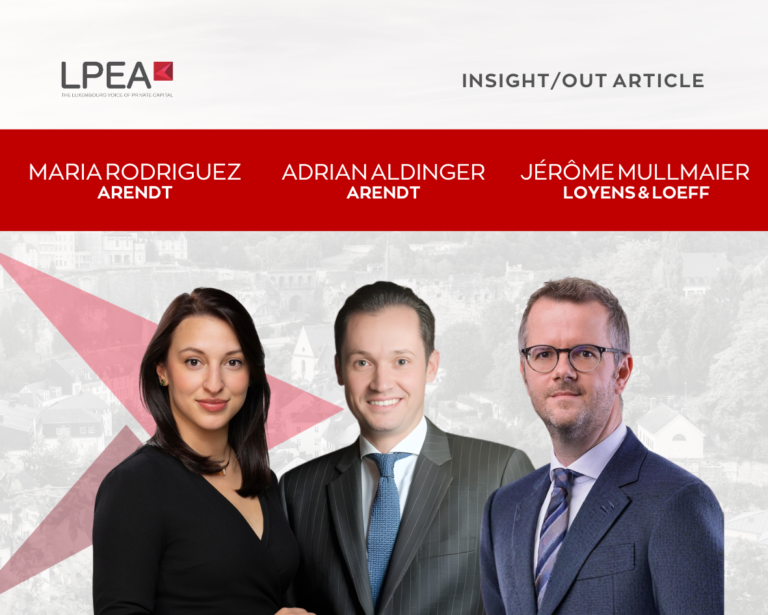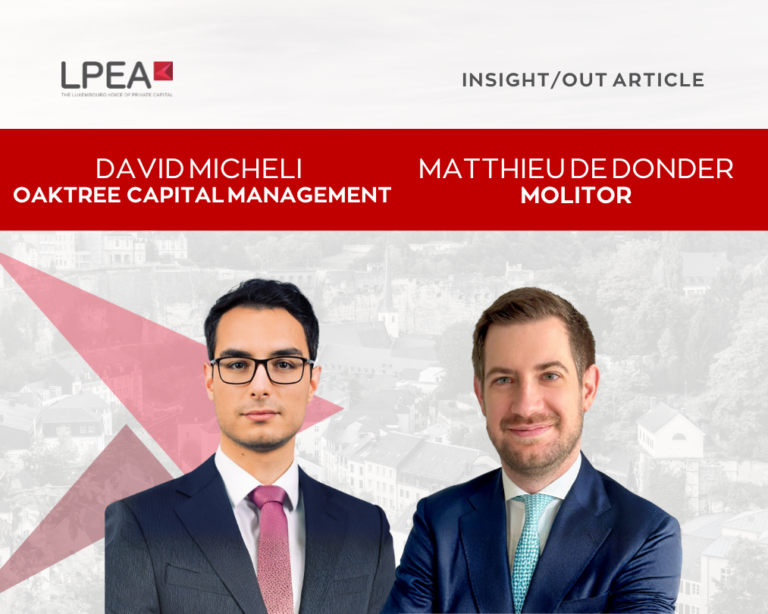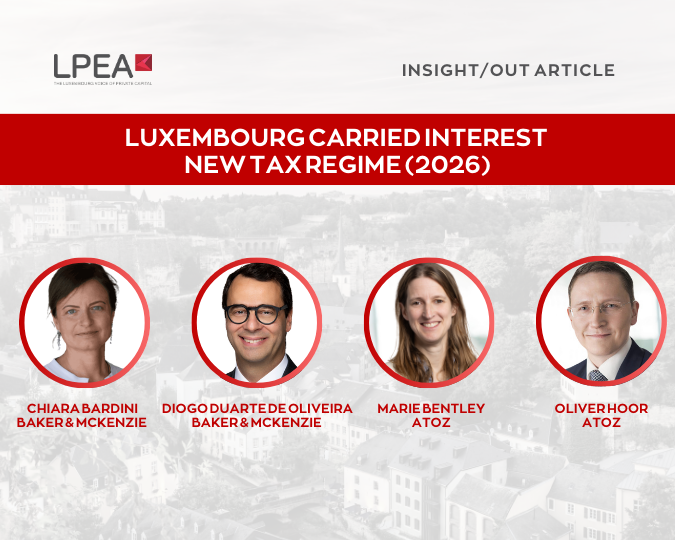By Eduard von Kymmel, Founder of id Linked® and member of the LPEA iNED Club as published in Insight Out #28.
The role of independent directors has changed over the last few years.
Independent non-executive directors (iNEDs) are facing higher demands in Luxembourg – quite in line with the trends observed in the U.S. and the UK. Globally, this is due to the growing necessity to set standards for corporate governance. Locally, this trend is also coupled with the tremendous increase in funds domiciled in Luxembourg, especially AIFs. Accordingly, regulatory requirements related to functions and oversight are strengthened – putting additional pressure on boards.
Carine Feipel, ex ILA Chairperson got to the heart of the matter in a recent interview:
“The role of the board member has become more professional over the past years, which comes alongside an increase in responsibilities. For all regulated companies, the expectations placed on boards of directors have risen sharply. Today, the regulator expects much greater involvement and decision-making on multiple issues from directors. The days of ’passive’ directors are over.”
Indeed, processes and definitions related to governance have been formalized over the last three years, including a clearer delineation of the role of iNEDs and boards. Until recently, the Independent Director was quite often more of a silent participant in board meetings – if an iNED was appointed at all. In today’s evolving landscape, iNEDs are expected to have a strong understanding of corporate governance principles and practices. They should actively participate in board meetings, provide oversight on risk management, and ensure compliance with relevant regulations and laws.
To illustrate even further, in one of their last joint events, Deloitte and ILA labelled iNEDs “Guardians of Public’s interest,” willing to advocate on behalf of investors and to help the board achieve the best possible performance.
What type of profiles do fund initiators expect from iNEDs today?
The recent trend shows that Luxembourg’s core industry is shifting from a mere holding function to a fully-fledged investment platform jurisdiction. Indeed, Luxembourg seized Brexit to become a leading EU alternative investment fund platform. In response, the regulation is requiring more functions to be Luxembourg-based, with the corresponding oversight. In that sense, having a local director is a real asset for maintaining contact with the authorities and providing knowledge of specific local regulations.
Qualitative substance is likely to be the next challenge. And there too, iNEDs can make the difference; a balanced board reflects the company’s general governance.
In light of this evolution, we have asked some of our company members and fund initiators how they perceive the role of iNEDs and what they expect from them.
For Andreas Kalusche, CEO of Prime Capital AG, the main reason to appoint an iNED is to balance deficits in experience. Since “new” topics such as sustainability (ESG), risk management, technology or digitalization are increasingly in demand and established boards of directors often have weaknesses in these areas, iNEDs can overcome these with their experience.
Andreas Kalusche: “With independent directors, you can balance a board of directors. After analysing what experience and qualities are missing, these can and should be compensated for with an iNED. This is how a board can perform at its best.”
Additionally, an iNED gets executives to leave the ivory tower and engage with new perspectives and processes.
Philipp Good, CEO of ESG-AG, says “The whole board benefits from an independent director; he/she brings a different mindset than internal executives and can thus initiate fruitful discussions. Their ability to think outside the box moves the whole board forward and enables new directions to be explored.” Indeed, with their unbiased view from the outside, iNEDs can help break up outdated processes and push forward. They enrich every board of directors with their diverse experience and new ways of thinking. They look where executive members prefer not to look too closely. Their independence makes it easier for them to point out internal problems. This can be an uncomfortable process, but in the end, it benefits the board.
Fund initiators also expect iNEDs to give new impulses to the Board with their soft skills, background, and network – ultimately, with their whole personality. Christoph Gisler, Head of Infrastructure Equity and Member of Executive Committee at Swiss Life Asset Management, puts it this way: „Independent directors enrich a board of directors. Professional qualification, business proximity and leadership skills strengthen every organization”. Being comfortable, speaking one’s mind and high integrity are personality traits that drive successful, independent directors. This requires the self-confidence to address problems clearly and openly. An iNED is therefore expected to have high standards, not only when it comes to their experience, but also in terms of their soft skills. The commitment to build a long-term relationship and shared values with the executive team is therefore also key.
How to find the ideal profile; what added value?
Finding the right independent director is not just about ticking off the boxes and filling a seat – it’s about finding the right person to help a company succeed.
Evaluate your current board composition – the maturity of your company should determine its board composition.
- At an early stage, an active board focusing on development will drive optimal activity. For this, iNEDs can leverage their professional network and connections to benefit the fund. This could involve introducing potential investors, identifying business opportunities, or facilitating partnerships and collaborations.
- Later on, a thinking board will focus on strategy. iNEDs can contribute to the fund’s strategic decision-making process. They can bring fresh perspectives, challenge assumptions, and provide valuable insights based on their experience and expertise.
- Moving forward a connecting board will see communication as its focus. iNEDs will actively participate in board meetings, provide oversight on risk management, and ensure compliance with relevant regulations and laws.
Determine your optimal board composition – look at your company’s long-term strategy and the critical knowledge required to achieve this desired evolution. Consider other attributes (director tenure, age, diversity).
Identify the gaps – the CSSF recommends assessing the board on both a collective and individual basis. To this end, check out the matrix outlined in Annex II of the EBA Guidelines 2017/12. This is a great starting point to get a complete picture of your board’s strengths and weaknesses.
Launch the search – take the time to create a tailored director profile with the gaps identified. To appoint the perfect match, use your network but also think outside the box. iNEDs should be neutral and prioritize the company’s best interests to ensure impartiality – advice from your third-party providers may not always be impartial. Independent NEDs platforms and iNED clubs like LPEA may offer just what you need in terms of diversity, expertise, languages, and background.
Listen to your gut – despite their expertise in the industry, iNEDs will always be in the delicate position of outsider on a board. None of their added value will shine through without excellent communication skills and shared values. Getting to know their personality is essential in assessing the match and making your final decision.
Wrap up: iNEDs are support and added value for board performance.
Today, in a world where agility in decision-making is essential, effective communication between the board and the management is a competitive advantage.
From a tacit assessor to an active contributing actor; the role of iNED has done a 180, sharpening the edges of boards. Committed, open-minded, experienced, and modern team players form the new generation of iNEDs. What could be considered a side job in retirement a few years ago has evolved into a full-time job that requires the right qualifications, mindset, skills, and attitude.
It is up to companies to leverage the added value this evolved role brings to making the right choice for the director position!
If you are looking for an iNED for your investment vehicle, the LPEA iNED club offers a pool of professional non-executive directors. Furthermore, our digital match-making search platform id Ship offers access to more than 300 iNEDs.




